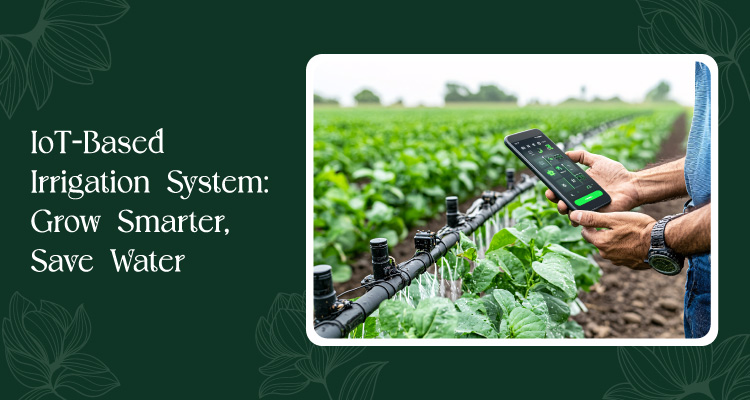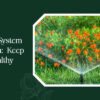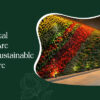With the increasing population, global climate changes, and diminishing water availability sectors such as agriculture and gardening are facing significant challenges. A smart IoT-based irrigation system through the Internet of Things is the solution to developing traditional irrigation systems into precision irrigation. These intelligent systems optimise water usage while maximising yields, replacing manual methods with automated, data-driven approaches that allow individuals to make informed decisions.
While water scarcity is on the rise, an IoT irrigation system offers green solutions that work in favour of both the cultivators and the environment. An IoT irrigation system makes water usage more efficient and reduces labour costs while offering valuable insights for better crop management.
A] What is an IoT-Based Irrigation System?
An IoT-based irrigation system allows advanced devices to monitor and manage water supply without major human involvement. These sensor systems are usually spread throughout the field/garden to monitor and collect insights on soil moisture, temperature, humidity, and weather conditions. The sensor then transfers the collected data with the control process to determine when to activate the water pump and valves.
These revolutionary systems maintain their connection to cloud-based platforms that store data, implement machine learning operations, and provide long-distance control capabilities. Water irrigation systems using IoT technology adapt dynamic systems that monitor water needs through sensors before starting water supply. When soil reaches specified dryness criteria, it stops irrigation and suspends watering when rain is detected.
Want to Save Water?
Consult us for an IOT-based Irrigation system!
B] Benefits of an IoT-Based Irrigation System
Remote Monitoring & Intelligent Data Collection
An IoT smart irrigation system enables cultivators to check field conditions even when they are located in remote areas. Mobile apps allow cultivators to review real-time field data so they can make decisions without needing to be at the place of cultivation. These systems gather detailed information regarding soil monitoring, temperature, moisture level, and rainfall patterns and give a sophisticated perspective of growing conditions through automated system learning abilities.
Resource Conservation & Cost Reduction
Traditional irrigation systems used to waste about 60-70% of water due to excessive water usage and evaporation. An IoT irrigation system supplies exact water requirements, which helps to achieve between 30-50% water savings. This highly directed water distribution method saves water resources while preventing soil erosion and nutrient leaching.
Water irrigation systems using IoT naturally consume less energy as pumps work only when there is a need for water. The deployment of IoT-controlled irrigation systems significantly reduces expenses for workforces, water consumption bills, and energy requirements.
Environmental Impact
An automated irrigation system using IoT helps maintain environmental preservation as it delivers precise water quantities that reduce runoff accidents which transport fertilisers into water bodies. Optimised irrigation practices protect surface water bodies through reduced water uptake and simultaneously generate healthier plants with better soil conditions.
C] How Does an IoT Smart Irrigation System Work?
Implementing an IoT smart irrigation system gives cultivators and landowners mental relief as it optimises water distribution in agriculture and landscaping operations. It has a sensor that monitors and understands soil moisture, weather conditions, and plant requirements. Then, the data is transferred to a central hub, often a cloud-based system, for analysis. Based on the analysis, the system automatically makes changes to water flow schedules.
The IoT-driven automatic irrigation system adjusts its operational parameters based on precise planting conditions and local natural environments to suit specific crops. Automatic water distribution management has a system that carries out ideal water distribution, which reduces water wastage while reducing labor costs and increasing plant quality and yields. The use of an IoT-based irrigation system develops an efficient and sustainable environment.
D] Applications of IoT-Based Water Irrigation System
Hydroponic & Urban Gardening
An IoT smart irrigation system monitors all aspects, such as water delivery, nutrient concentration, and pH level balance in hydroponic systems. The development of landscaping design for hydroponic gardening has created new opportunities to establish urban agriculture systems in areas that were previously unusable. These systems have become essential tools for gardener services to maintain various urban properties and allow centralised management of diverse installations across apartment balconies, corporate campuses, and residential gardens.
Agriculture & Landscaping
The agricultural sector functions as the main user base for an IoT-based irrigation system that create personalised irrigation watering schedules for different crops across different field sections. Landscaping businesses use water irrigation systems using IoT for maintaining public parks, golf courses, and private residential areas. The systems provide essential benefits for lawn development in India, where traditionally maintaining lush greenery during the dry season requires extensive water. Several landscaping companies in Mumbai offer these solutions as one of their premium services.
E] Choosing the Right IoT-Based Irrigation System
When selecting the IoT-based irrigation system, considering scalability, sensor accuracy level, remote access feature, and cost is a must. For large-scale operations, enterprise-level systems work best as they offer advanced analytics and robust sensors. Small farms and residential gardens can go for a more affordable solution that still provides essential automation. Landscaping companies in India provide customised recommendations based on specific project requirements and climate conditions that help companies select appropriate irrigation solutions.
F] Future of Smart Irrigation Systems
The future of a water irrigation system using IoT seems bright with the evolving artificial intelligence and machine learning technologies. The advanced algorithms will support predictive irrigation in forecasting plant needs before time, based on patterns of plant growth and weather forecasts.
As costs decrease and interfaces become more intuitive, an IoT-based water irrigation system will become accessible to smallholder cultivators worldwide, democratising precision cultivation. Their collective effect could significantly reduce water consumption, which currently accounts for approximately 70% of global freshwater use.
Connect With Us Today
For expert advice and personalized solutions for your green space needs.
Call: +91-84339 29564 | Email: info@lucentcorporation.com
Conclusion
An IoT-based irrigation system transforms cultivation by increasing water efficiency, reducing costs, and enhancing sustainability. With automation and data-driven decision-making, cultivators can optimise irrigation, resulting in improved yields and the conservation of resources. As AI and machine learning continue to develop, such systems will keep transforming contemporary practices and environmental sustainability.

Mr. Dilip Murkute
As the founder of Lucent Gardens, Mr. Dilip Murkute draws from his years of experience in hospitality and entrepreneurship. His vision is to create functional, aesthetically pleasing green spaces. Under his leadership, Lucent Gardens delivers sustainable, high-quality landscaping solutions with a commitment to excellence and innovation.




